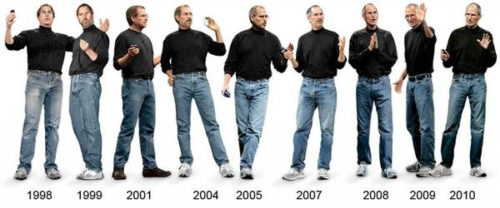This week, we share a simple and contentious question created by teachers on a recent training afternoon. It’s accessible for children of most ages:
Do we dress for ourselves or for others?
Your stimulus
To focus minds about this question in particular, you can use any stimulus related to clothing:
- The Oscars red carpet
- Queen Elizabeth II on why she wears bright colours
- Or this photo of Steve Jobs through the years:

Editor’s note:
Our stimulus on the day wasn’t actually about clothes at all, but an advert for cosmetic brand Dove from 2004 about airbrushing. Long-term readers might recognise it from a bulletin many moons ago. It’s a favourite of ours – a treasure trove for philosophical questions about beauty, appearance and deception. On another occasion you might want to just play it and get children to come up with own set of questions!
We ended up talking about the above question after ten minutes of opening thoughts about another. Moving on from the initial question to something juicier is no bad thing in P4C – follow the conversation, rather than feel a sense of obligation to what was asked first.
The activity: Do we dress for ourselves or for others?
The answer is likely to be “a mix of both, depending on the situation”. So form a Venn diagram on the floor with skipping ropes/hula hoops and ask children for examples that fit into either circle. And what would fit into the middle?
This kind of activity is best started as a class, then into pairs, and then back as a class. If they need some help, ask them to place:
- Dressing for an interview
- Wearing the shirt of your favourite football team
- Your costume at a fancy-dress party
- Dressing smart to a wedding
- Wearing school uniform
- Putting on a festive jumper
- When something is a present from someone else
Once you’ve argued over where things go, begin a broader discussion about the question. Encourage children to think about which we do more often – dress for ourselves, or for others. And are there any differences between:
- people generally and themselves?
- grown ups and children?
- the more well-off and the less well-off?
Possible further questions:
Is there a third (or fourth!) category? (for example religion, or tradition)
How in control are you of what you wear?
Are you ever in control of what you wear?
Does our choice of clothes show the real us, or mask the real us?
Of course, clothing is closely linked to gender. This kind of activity may be a playful way into this area, or you might stumble into it without planning to. Regardless we’d always recommend following your school’s guidance for facilitating discussions around it. The NSPCC is also an excellent place to seek advice and Oxfam has made a very good resource on complicated issues.
Best wishes,
Jason
P.S. For readers in Turkey or those (relatively few!) with the flexibility to travel there during term-time, the SOPHIA Network meeting is in Istanbul on 18 and 19 June. SOPHIA is the European Foundation for the Advancement of Doing Philosophy with Children, and the network meetings are always a great exchange of practice and theory as well as being very convivial. I don’t know if my workshop proposal will be selected yet, but either way hope to see some readers there!
P.P.S. One of my online Debate Club participants asked me to be his assessor for the Skills Section of the Duke of Edinburgh’s Award, reminding me that the philosophy, debate, improv, Shakespeare, Writers’ Club and even Dungeons and Dragons sessions we do over at www.p4he.org all meet the criteria for that section. So if you work with teens or have one of your own doing DofE, do encourage them to take a look!